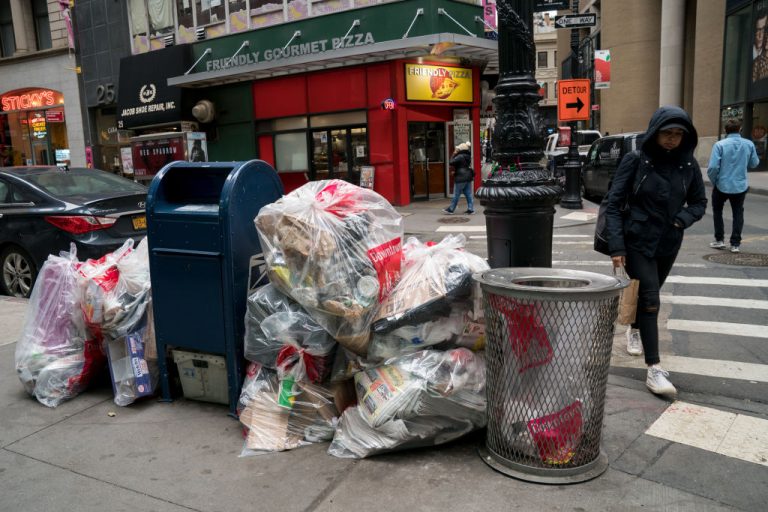On May 4, the Mayor’s Office of Ethnic & Community Media in collaboration with the newly appointed Department of Sanitation Commissioner, Jessica Tisch, held an ethnic media roundtable at Tribeca’s Sanitation Garage where it was discussed how New York’s Department of Sanitation intends on delivering New Yorkers the clean streets “they expect and deserve.”
Sanitation Commissioner, Jessica S. Tisch and José Bayona, Executive Director of the Mayor’s Office of Ethnic and Community Media were in attendance to speak as part of a series of meetings being held with local media and city leaders.
In her first official media event, Tisch promised “to work with our communities to understand what our community’s issues are and to work as partners with our communities to address them” saying that this approach is a “sign of what’s to come.”
Tisch comes to the Department of Sanitation after working for the city for almost 15 years. She spent over 12 years with the NYPD, starting as an Intelligence Analyst and then worked her way up through a variety of roles to the Deputy Commissioner of Information Technology where she was responsible for all the technology at the police department as well as 911 operations.
In her time with the city she also oversaw the operation of the city’s 311 system and call center where she worked with “virtually every single agency in New York City,” including the Department of Sanitation.
Success
You are now signed up for our newsletter
Success
Check your email to complete sign up
Tisch spent the first two weeks in her new role attending garages and meeting with city sanitation workers in all five boroughs. “They do so much more than clean the streets. They do so much more than make the black bags go away. They are public servants in the truest sense of the word and they are really part of the lifeblood of this city,” she said of her team.
Tisch is a lawyer, and in addition to her law degree she also holds a business degree. She believes her education and experience positions her “perfectly” to “really fight for this agency and to help get things done.” She said, “I am a get things done, or as the Mayor said, get stuff done, kind of person and I want to get stuff done for New Yorkers.”
Cleanliness a top priority
A top priority identified by the commissioner are clean streets saying, “I think that all New Yorker’s have seen an experience that the city is meaningfully less clean post pandemic than it was pre-pandemic and I believe that one of the most important things that the city needs to do now is to clean up our streets to give all New Yorker’s in every neighborhood and in every community the dignity of a clean living environment,” adding that, “I commit to you and I commit to every New Yorker that cleaning up the city is going to be my obsession.”
A key tool in her arsenal, to address the mess, which she says is the “most effective clean streets tool that we have” are mechanical brooms that, according to the Department of Sanitation, can collect upwards of 1,500 pounds of trash from New York City streets on any given day.
According to the commissioner, in order for the sweepers to be most effective, the reinstatement of alternate-side parking rules in the city is a requirement.
She said that suspending alternate-side parking rules “took a real toll on the cleanliness of neighborhoods and communities across the city” and that is why, on her first day as Sanitation Commissioner, she was “very proud” to announce that the city was restoring alternate-side parking to pre-pandemic levels effective July 5.
“This is very much in keeping with and central to the Mayor’s mission of bringing New York City back,” she said, adding that “You can’t bring New York City back if the streets don’t look good.”
In addition to clean streets she said that in order to “secure our collective future” the department must focus on sustainability asserting that sustainability is “central to the mission of the sanitation department.”
Clean Curbs program
One major initiative that her department is undertaking is what she calls the “Clean Curbs” program which involves the containerization of trash in each of the five boroughs.
She said “I know it’s something that the city has talked about for a long time, like containerization of trash on the streets, now it’s time to act.”
Containerization of trash is being heralded as a primary tool to combat New York’s rat problem that she says “intensified” as the pandemic raged in the city.
“Containerization of trash, getting those bags off of the curbs, will both address cleanliness and the rat situation,” she said.
The program will be tailored specifically for each neighborhood’s needs and circumstances.
While the new commissioner said the initiative will be “really hard” to implement she said that the program will be “tailored” not only for each neighborhood but “frankly like each street,” saying that the problem is not one that has never been solved.
“Other cities around the world have done this, it’s not an unsolved problem like, go to Barcelona, right, they have containerized their waste and the city and all residents benefit from that,” she said.
Later in May her department will be meeting with municipal leaders from Barcelona, to discuss the challenges New York is facing and potential solutions.
Mayor Adam’s announced an investment of $1.3 million in new funding for the city to run a pilot containerization program for both commercial and residential New Yorkers.
“Clean streets are vital to vibrant neighborhoods and to New York City’s economic comeback. We need to stop dodging black garbage bags and instead fund and test container models throughout the city that will make our streets cleaner and more inviting for both New Yorkers and visitors,” Adam’s said in a press statement launching the program.















